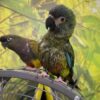FAQ’s
African Grey Parrots are often considered expensive for several reasons, reflecting their unique qualities and the challenges associated with their care and breeding:
- Intelligence: African Grey Parrots sale are renowned for their exceptional intelligence, often compared to that of a young child. Their ability to learn an extensive vocabulary and understand complex concepts contributes to their high value as pets.
- Longevity: African Grey Parrots sale have long lifespans, often living for several decades in captivity when properly cared for. This longevity translates to a long-term commitment for owners, increasing the perceived value of these birds.
- Limited Breeding Success: Breeding African Grey Parrots sale can be challenging, particularly in captivity. Factors such as the birds’ complex social dynamics, dietary requirements, and breeding behavior contribute to lower breeding success rates, resulting in limited availability and higher prices for offspring.
- Socialization and Training: Hand-raising and socializing African Grey Parrots from a young age requires significant time, effort, and expertise. Birds that have been hand-fed and well-socialized from an early age are often more desirable and command higher prices due to their sociable nature and ease of handling.
- Demand and Rarity: African Grey Parrots sale are highly sought after by bird enthusiasts and pet owners worldwide, leading to high demand and limited availability. This combination of high demand and relative rarity contributes to the higher prices associated with African Grey Parrots.
Overall, the combination of intelligence, longevity, limited breeding success, socialization requirements, and high demand contributes to the perceived value and higher prices of African Grey Parrots in the pet market.
African Grey Parrots are primarily herbivores, meaning their diet consists mainly of fruits, vegetables, seeds, nuts, and grains. In their natural habitat, they may also consume some insects and small amounts of protein-rich foods, such as eggs, to supplement their diet. However, meat is not a significant part of their natural diet, and they do not require it for nutritional balance.
In captivity, it is not necessary to feed African Grey Parrots meat or animal protein, as they can thrive on a well-balanced diet of fruits, vegetables, pellets, and other nutritious foods. Providing a varied and nutritious diet that meets their specific nutritional needs is essential for their health and well-being.
While occasional small amounts of cooked, lean meat or cooked eggs can be offered as treats, it is important to avoid feeding them high-fat or salty foods and to consult with a veterinarian or avian nutritionist for guidance on the best diet for your African Grey Parrot.








Reviews
There are no reviews yet.